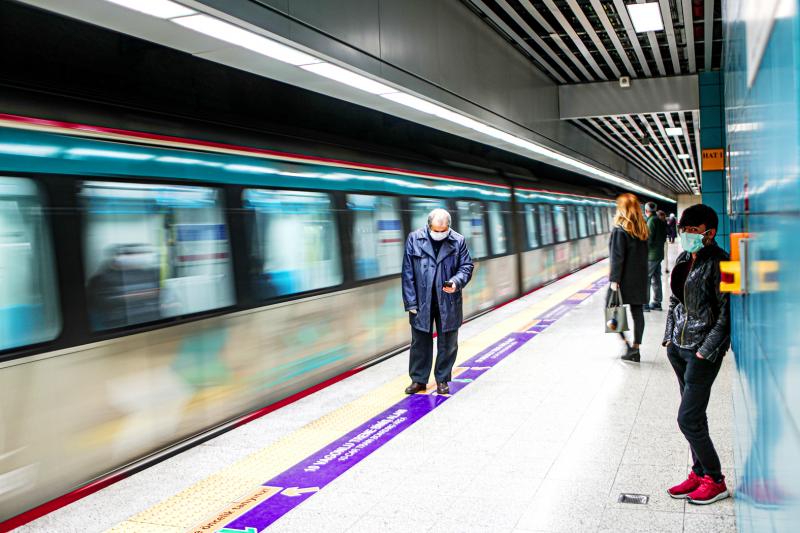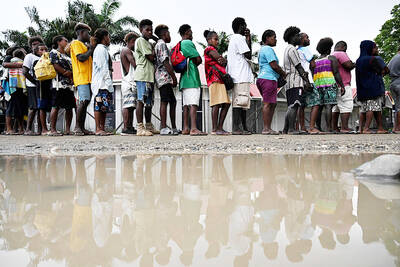Turkish President Recep Tayyip Erdogan has stepped up measures to stem a rapidly growing number of COVID-19 cases in Turkey, but his refusal to impose a full lockdown to keep the economy afloat is drawing criticism.
With gatherings banned, restrictions on intercity trips, and the obligation to wear masks almost anywhere, Erdogan has imposed a series of tough measures, but has thus far resisted calls for a complete confinement.
Parliament began on Tuesday debating a government-sponsored bill to release up to one-third of detainees in the country’s overcrowded prisons as a safety measure against the coronavirus outbreak.

Photo: EPA-EFE
With 34,109 cases and 725 deaths, according to official figures published on Tuesday, Turkey is the ninth-most affected country in the world by the COVID-19 pandemic.
What is alarming is the fast spread of the disease in Turkey, which reported its first official case on March 11. The number of cases is doubling in every few days: From 7,400 on March 28, it reached 15,000 on Wednesday last week and exceeded 30,000 on Monday, official figures showed.
The government very quickly took nationwide measures from shutting schools and cultural spaces to suspending flights with the countries hit by the virus.
They have been gradually reinforced with a confinement order for people aged 65 and older, and under the age of 20, and dozens of towns and villages have been quarantined.
On Tuesday, Turkish Minister of Health Fahrettin Koca said in a reassuring tone that the occupancy rate in intensive care units was only about 60 percent, but as the number of victims soars, there have been increasing calls on the government to impose a complete confinement as seen in Italy or France.
“Everyone absolutely has to stay at home, it must be made compulsory,” a doctor who treats infected patients under intensive care at an Istanbul hospital told reporters on condition of anonymity.
“We are receiving more and more patients every day. We will soon reach the limits of our capacity,” the doctor said.
Opposition parties, the Turkish Medical Association (TTB) and unions have also urged the government to take tougher measures to deter people from going out.
“It will be impossible to control this pandemic if millions of people ... go out to work,” TTB president Sinan Adiyaman, told the Turkish media this week.
In an interview last week, Istanbul Mayor Ekrem Imamoglu called for a confinement in the country’s economic capital where more than half of the COVID-19 cases have been recorded.
“Even if 15 percent of the population goes out, we quickly reach 2 million people... This has the potential to increase the threat,” Imamoglu said.
Erdogan has so far urged Turks to place themselves in “voluntary quarantine” rather than declare a compulsory order for them to stay home, in an attempt not to stop an already fragile economy, which has been in a recovery state after years of crises.
Before any hardening of the measures, many Turks have already taken their own precautions.
Most of Istanbul’s usually busy arteries, including the pedestrian Istiklal Street, are almost completely deserted.
Many Turks no longer set foot outside — some of them have returned to the age-old tradition of lowering baskets through their window for their groceries, while some others rely on very efficient delivery services.
The doctor hailed residents’ common sense and “good measures” taken by the government, which has ramped up tests to more than 200,000.
However, he said: “If the number of cases keeps increasing at this pace, the result will be the same as elsewhere: many losses of lives. We have already lost a lot of time.”

SEEKING CHANGE: A hospital worker said she did not vote in previous elections, but ‘now I can see that maybe my vote can change the system and the country’ Voting closed yesterday across the Solomon Islands in the south Pacific nation’s first general election since the government switched diplomatic allegiance from Taiwan to Beijing and struck a secret security pact that has raised fears of the Chinese navy gaining a foothold in the region. The Solomon Islands’ closer relationship with China and a troubled domestic economy weighed on voters’ minds as they cast their ballots. As many as 420,000 registered voters had their say across 50 national seats. For the first time, the national vote also coincided with elections for eight of the 10 local governments. Esther Maeluma cast her vote in the
Nearly half of China’s major cities are suffering “moderate to severe” levels of subsidence, putting millions of people at risk of flooding, especially as sea levels rise, according to a study of nationwide satellite data released yesterday. The authors of the paper, published by the journal Science, found that 45 percent of China’s urban land was sinking faster than 3mm per year, with 16 percent at more than 10mm per year, driven not only by declining water tables, but also the sheer weight of the built environment. With China’s urban population already in excess of 900 million people, “even a small portion

UNSETTLING IMAGES: The scene took place in front of TV crews covering the Trump trial, with a CNN anchor calling it an ‘emotional and unbelievably disturbing moment’ A man who doused himself in an accelerant and set himself on fire outside the courthouse where former US president Donald Trump is on trial has died, police said yesterday. The New York City Police Department (NYPD) said the man was declared dead by staff at an area hospital. The man was in Collect Pond Park at about 1:30pm on Friday when he took out pamphlets espousing conspiracy theories, tossed them around, then doused himself in an accelerant and set himself on fire, officials and witnesses said. A large number of police officers were nearby when it happened. Some officers and bystanders rushed

HYPOCRISY? The Chinese Ministry of Foreign Affairs yesterday asked whether Biden was talking about China or the US when he used the word ‘xenophobic’ US President Joe Biden on Wednesday called for a hike in steel tariffs on China, accusing Beijing of cheating as he spoke at a campaign event in Pennsylvania. Biden accused China of xenophobia, too, in a speech to union members in Pittsburgh. “They’re not competing, they’re cheating. They’re cheating and we’ve seen the damage here in America,” Biden said. Chinese steel companies “don’t need to worry about making a profit because the Chinese government is subsidizing them so heavily,” he said. Biden said he had called for the US Trade Representative to triple the tariff rates for Chinese steel and aluminum if Beijing was